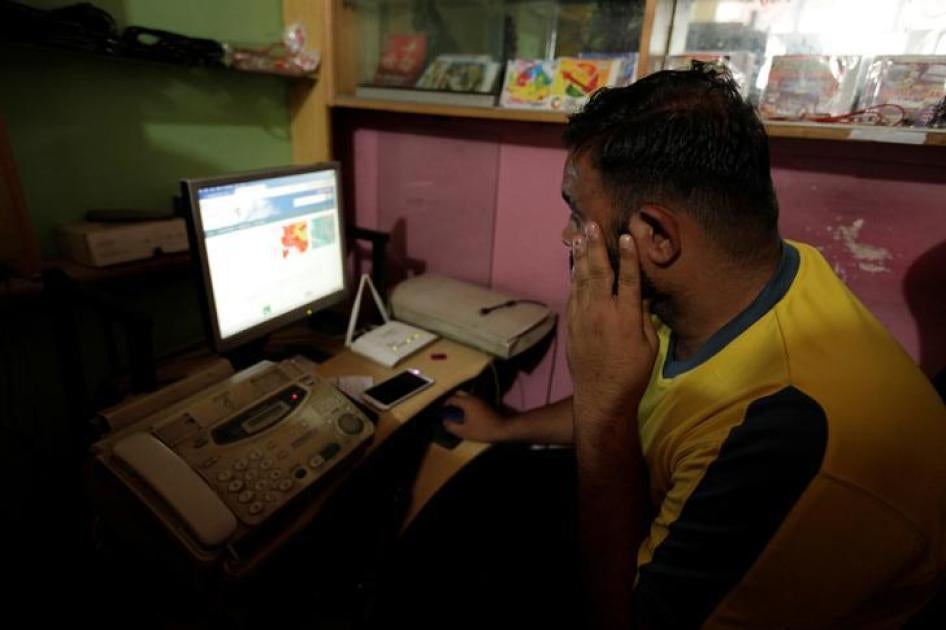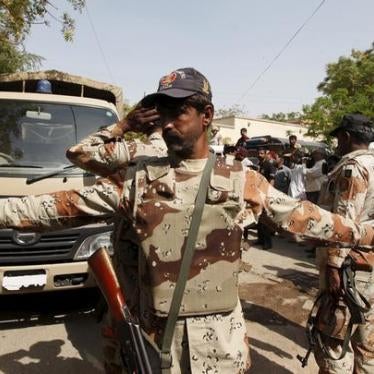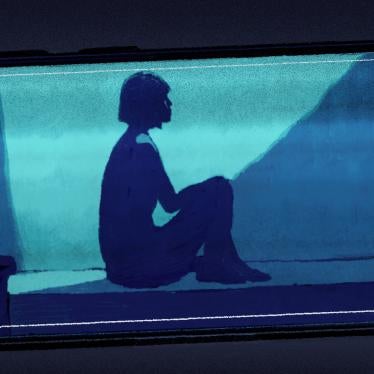(New York) – The Pakistani government should immediately end its crackdown on peaceful speech on the internet, Human Rights Watch said today. The authorities should cease intimidating internet critics of the military and government, and release those arbitrarily detained for non-violent comments on social media.
On May 25, 2017, Pakistan’s interior minister announced new rules that would severely restrict online anonymity. These new measures threaten greater censorship, arbitrary arrests of critical internet voices, and violence by militant groups against activists and members of religious minorities.
“Prime Minister Nawaz Sharif’s government is leading an all-out assault against free speech on the internet,” said Brad Adams, Asia director. “The authorities need to cease harassing and prosecuting citizens for critical speech and urgently revise laws to meet international free expression standards.”
On May 20, Pakistan’s Federal Investigation Agency (FIA) arrested six people for comments made on the internet. An FIA official told Reuters that, “We have received a huge list of suspects, active against national institutions, but we have identified 18 out of over 200 social media activists. They are accused of spreading negative material against the army and other institutions.”
On May 25, Interior Minister Chaudhry Nisar Ali Khan announced expanded suppression of social media and the government’s intention to clamp down on online anonymity by linking the social media accounts of each user to their cell phone number. This follows previous government efforts to ensure mobile phones are registered with fingerprints so that they can be linked to specific individuals. Khan said he was acting on instructions from Prime Minister Sharif.
Oppositional political parties in Pakistan have alleged that their workers and party members are being intimidated, harassed, and detained for making comments on social media. The Pakistan Tehrik-e-Insaf (PTI) party has claimed that at least two of its members, Owais Khan and Salaar Kakar, had been detained by the FIA for many days before being released without charges being made public. The FIA allegedly picked up Dr. Faisal Ranjha, a supporter of the ruling Pakistan Muslim League (Nawaz) on May 21.
According to media reports, the FIA has interrogated at least 40 people and seized their laptops, mobile phones, and tablets for forensic evaluation. This followed the Pakistan Telecommunication Authority (PTA) sending a text message on May 10 to millions of citizens warning against sharing “blasphemous” content on social media and directing them to report such content. On May 14, Nisar Ali Khan ordered the FIA to take immediate action against “all those dishonoring the Pakistan Army through social media.”
The authorities have also cracked down on journalists. On May 18, Taha Siddiqui, a journalist and the Bureau Chief for World Is One News (WION) received a call from an official of the FIA’s counterterrorism wing demanding that he appear at the FIA headquarters for questioning about opinions expressed in his journalistic work. According to Siddiqui, when he asked for the legal basis for being summoned, the FIA official threatened him. On May 23, the Islamabad High Court issued an order to restrain the FIA from harassing Siddiqui. The FIA then posted an undated notice directing Siddiqui to appear before the FIA’s counterterrorism wing on May 26.
Pakistani authorities have a long history of abuses against peaceful critics of the government and state security forces. Pakistani and international human rights groups, including Human Rights Watch, have extensively documented intimidation, torture, enforced disappearances, and killings of activists and journalists. The Taliban and other armed groups have also threatened media outlets and assaulted and killed journalists and activists for their work.
Pakistani law already adds to the hostile climate faced by journalists and activists,. In August 2016, the government enacted a vague and overbroad cybercrimes law that threatened rights of privacy and freedom of expression. The law included provisions that allow the government to censor online content, criminalize internet user activity, and access internet user data without prior judicial authorization.
Five activists – prominent poet Salman Haider, bloggers Waqas Goraya, Aasim Saeed, and Ahmad Raza Naseer, and social rights activist Samar Abbas – went missing or were taken away from different cities between January 4 and January 7. All five men were vocal critics of militant Islamist groups and Pakistan’s military establishment, and expressed their views on the internet. Four out of the five – all but Samar Abbas – have since been released. Waqas Goraya went to the Netherlands after his release and alleges that the security forces tortured him “beyond limits,” by punching, slapping, and forcing him into stress positions.
The recent measures by the government are having a chilling effect on freedom of expression in an already very restricted environment in Pakistan. Human Rights Watch has received reports of individuals deactivating and deleting social media accounts to avoid prosecutions and arrests.
“Pakistan’s government should realize that punishing peaceful dissent will cause greater damage to its image than the criticism itself,” Adams said. “The government’s recent actions are making a mockery of Pakistan’s claims of democratic rule.”









